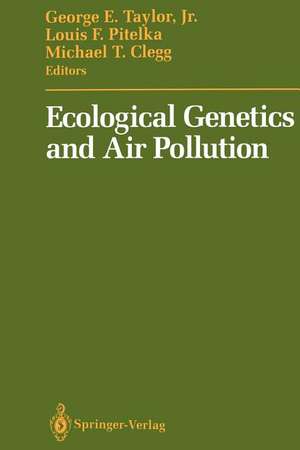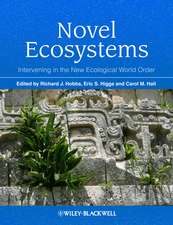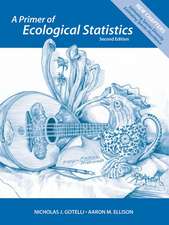Ecological Genetics and Air Pollution
Editat de George E. Jr. Taylor, Louis F. Pitelka, Michael T. Cleggen Limba Engleză Paperback – 29 oct 2011
Preț: 392.75 lei
Nou
Puncte Express: 589
Preț estimativ în valută:
75.17€ • 78.18$ • 62.99£
75.17€ • 78.18$ • 62.99£
Carte tipărită la comandă
Livrare economică 14-28 martie
Preluare comenzi: 021 569.72.76
Specificații
ISBN-13: 9781461277804
ISBN-10: 1461277809
Pagini: 359
Ilustrații: XIII, 359 p.
Dimensiuni: 155 x 235 x 20 mm
Greutate: 0.53 kg
Ediția:Softcover reprint of the original 1st ed. 1991
Editura: Springer
Colecția Springer
Locul publicării:New York, NY, United States
ISBN-10: 1461277809
Pagini: 359
Ilustrații: XIII, 359 p.
Dimensiuni: 155 x 235 x 20 mm
Greutate: 0.53 kg
Ediția:Softcover reprint of the original 1st ed. 1991
Editura: Springer
Colecția Springer
Locul publicării:New York, NY, United States
Public țintă
ResearchCuprins
1 Introduction.- 2 Evolution in Relation to Environmental Stress.- 3 Ecological Genetics and Chemical Modifications of the Atmosphere.- 4 Atmospheric Pollution and Terrestrial Vegetation: Evidence of Changes, Linkages, and Significance to Selection Processes.- Commentary to Chapter 4 Evidence of Changes, Linkages, and Significance of Atmospheric Pollution to the Selection Process.- 5 Genetics of Response to Atmospheric Pollutants.- Commentary to Chapter 5 Genetics of the Resistance of Plants to Pollutants.- 6 Population Processes in Plants and the Evolution of Resistance to Gaseous Air Pollutants.- Commentary to Chapter 6 Population-Level Processes and Their Relevance to the Evolution in Plants Under Gaseous Air Pollutants.- 7 Consequences of Evolving Resistance to Air Pollutants.- Commentary to Chapter 7 Estimating Costs of Air Pollution Resistance.- 8 The Physiological Basis of Differential Plant Sensitivity to Changes in Atmospheric Quality.- Commentary to Chapter 8 Possible Genetic Effects of Continually Increasing Atmospheric CO2.- 9 Molecular Characterization of Plant Responses to Stress.- Commentary to Chapter 9 (A) Common Mechanisms of Intracellular Stress Induction by Atmospheric Pollutants and the Role of Genes and Mutation in Damage Alleviation.- Commentary to Chapter 9 (B) Genomic Stress, Genome Size, and Plant Adaptation.- 10 Population-Level Techniques for Measuring Microevolutionary Change in Response to Air Pollution.- Commentary to Chapter 10 Ecological Genetics of Plant Populations in Polluted Environments.- 11 Ecological Genetics and Changes in Atmospheric Chemistry: The Application of Knowledge.- Commentary to Chapter 11 (A) Plant Ecological Genetics and Air Pollution Stress: A Commentary on Implications for Natural Populations.- Commentary to Chapter 11 (B) Ecological Genetics and Changes in Atmospheric Chemistry: A Commentary on Application of Knowledge in Managed Forest Systems.- Species Index.









